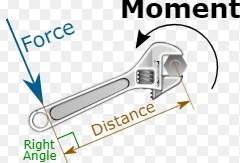Moment
In terms of physics, a moment is the product of a physical quantity and a certain distance, and is usually defined with respect to a fixed reference point. Generally, a moment can be produced by any physical quantity that is multiplied by distance, with commonly-used quantities including force, mass, electric charge, and so on.
The moment of force that acts on an object, known as ‘torque’, is a measure of its tendency to cause the object to rotate about a specific point or axis, and is the product of the force and its distance from the point or axis.
Moment (M) = force (F) x distance (d)
For a moment to develop, the force must act in such a manner that the object begins (or would begin) to twist; in other words, when the force does not have an equal and opposite force directly along the line of action. For example, if two people are stood on opposite sides of a door and both are pushing on it with an equal force then there is equilibrium. If one person stops pushing then there would be no opposing force and the person still pushing would have created a moment of force.
The fixed reference point is also known as the ‘centre of moments’. This can be the actual point about which rotation occurs due to the force, or the axis about which the force may be considered as causing rotation.
A bending moment (BM) is a measure of the bending effect that can occur when an external force is applied to a structural element. This concept is important in structural engineering as it is can be used to calculate where, and how much bending may occur when forces are applied.
For more information see: Bending moment.
[edit] Related articles on Designing Buildings Wiki
Featured articles and news
Some of the articles relating to water, here to browse. Any missing?
Recognisable characters of Gothic architecture designed to dramatically spout water away from buildings.
A case study and a warning to would-be developers
Creating four dwellings... after half a century of doing this job, why, oh why, is it so difficult?
Reform of the fire engineering profession
Fire Engineers Advisory Panel: Authoritative Statement, reactions and next steps.
Restoration and renewal of the Palace of Westminster
A complex project of cultural significance from full decant to EMI, opportunities and a potential a way forward.
Apprenticeships and the responsibility we share
Perspectives from the CIOB President as National Apprentice Week comes to a close.
The first line of defence against rain, wind and snow.
Building Safety recap January, 2026
What we missed at the end of last year, and at the start of this...
National Apprenticeship Week 2026, 9-15 Feb
Shining a light on the positive impacts for businesses, their apprentices and the wider economy alike.
Applications and benefits of acoustic flooring
From commercial to retail.
From solid to sprung and ribbed to raised.
Strengthening industry collaboration in Hong Kong
Hong Kong Institute of Construction and The Chartered Institute of Building sign Memorandum of Understanding.
A detailed description from the experts at Cornish Lime.
IHBC planning for growth with corporate plan development
Grow with the Institute by volunteering and CP25 consultation.
Connecting ambition and action for designers and specifiers.
Electrical skills gap deepens as apprenticeship starts fall despite surging demand says ECA.
Built environment bodies deepen joint action on EDI
B.E.Inclusive initiative agree next phase of joint equity, diversity and inclusion (EDI) action plan.
Recognising culture as key to sustainable economic growth
Creative UK Provocation paper: Culture as Growth Infrastructure.
























